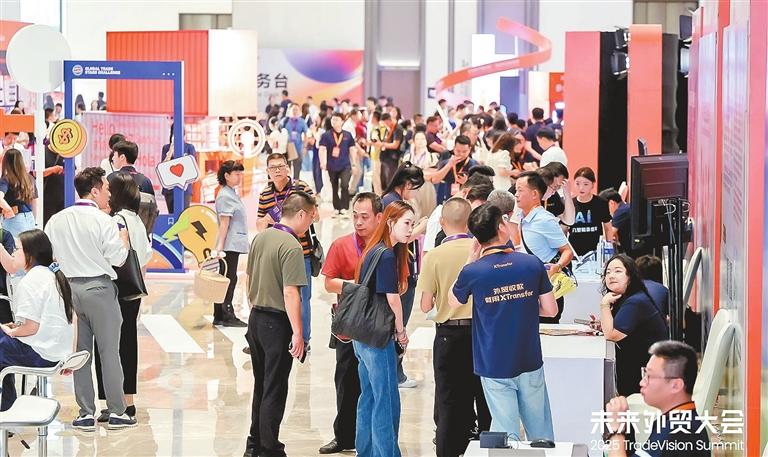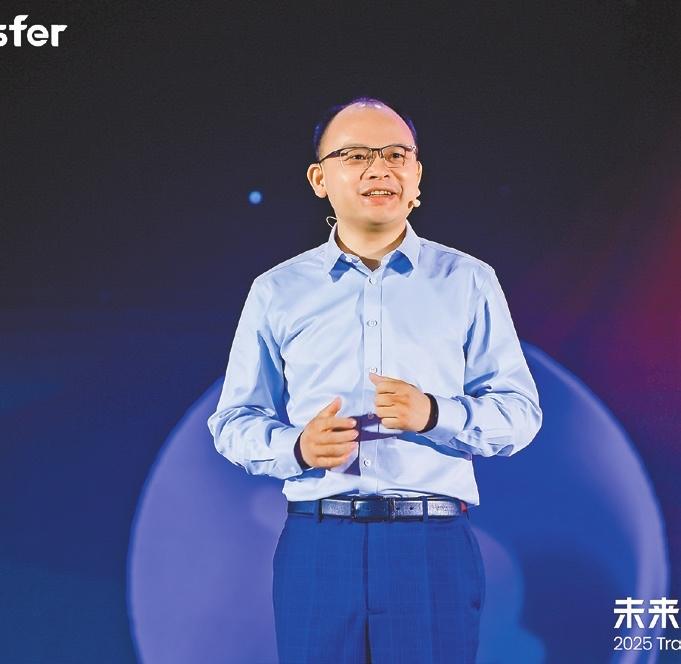

Debra Li debra_lidan@163.com SHANGHAI‑BASED Xtransfer, China’s leading payment platform for B2B cross‑border trade, grew its customer base from 550,000 to 700,000 in a single year despite headwinds from trade protectionism and shifting U.S. tariff policies, CEO and co‑founder Bill Deng told an audience of 3,000 at the Xtransfer TradeVision Summit in Guangzhou on Tuesday. Xtransfer’s full‑featured payment platform offers a one‑stop solution that includes foreign trade collection, multi‑currency cash management, foreign exchange, and investment and risk‑management services. The platform works with both Chinese and international banks, including JPMorgan Chase, Bank of China, and DBS, and is accessible in more than 200 countries and regions. It currently processes about US$10 billion in transactions per month. Deng credited much of the company’s progress to artificial intelligence (AI), which he called the defining technological advancement of the era. Building on several open‑source large language models (LLMs), Xtransfer’s algorithm engineers have trained an in‑house AI agent named TradePilot. TradePilot helps the company sift through vast amounts of online information and the platform’s own client data to strengthen risk control while preserving a fast, user‑friendly experience. “In 99% of cases, clients won’t even notice when we vet their credibility,” Deng explained. “When a new client from Mexico registers, our AI searches and analyzes publicly available data — company websites, social media, customs records, online shops, [and] even Google Maps. The agent processes information in multiple languages, producing structured outputs such as the client’s line of business and projected trade volume. Those outputs feed into our credibility rating.” He gave another example in which transaction metadata consisted of a seemingly random string of letters and numbers. The AI quickly identified the code as a porcelain tile model, enabling the system to classify the item correctly. “Only when the system cannot assess the legality of a transaction do our staff step in for closer review, which saves a lot of time and labor,” he said. Rapid client growth from overseas markets has been a major driver of Xtransfer’s expansion. Currently, 47% of the platform’s users are based outside China. To support global customers, the company maintains local sales teams as well as a global service center and risk‑control center in Malaysia. Deng described different paths to international expansion. Entering developed markets typically involves obtaining a payments license and forging partnerships with local banks, ensuring full compliance with local laws and regulations. In less developed markets, Xtransfer sometimes helps local banks build digital infrastructure. “We’ve developed our own API so that banks in less developed regions can quickly construct online systems based on our platform,” Deng said. He added that the company has also built a five‑step risk‑control module to support these integrations. In the past year, Xtransfer launched foreign trade collection services in Mexico, Brazil, Ghana, South Africa, Turkey, and Egypt, further expanding its reach and client base. On the topic of stablecoins, Deng noted that although they are not yet officially permitted on the Chinese mainland, he expects rapid progress in the sector after the U.S. passed the GENIUS Act in July, establishing a regulatory framework for the roughly US$250 billion stablecoin market. Now in its seventh edition, the Xtransfer summit featured successful foreign‑trade merchants sharing experience and know‑how, as well as analysts such as Wu Xiaobo discussing foreign‑trade trends, strategies, and the broader outlook for the Chinese economy. At the event, Xtransfer also released its July Small and Medium Enterprises (SME) B2B Merchandise Export Purchasing Manager Index — the Xtransfer PMI — which stood at 52.4, indicating expansion among China’s SME exporters. The index, compiled from a poll of 2,000 foreign traders across 116 cities in 28 provinces and regions on the Chinese mainland who use the Xtransfer platform, analyzed metrics including export orders, prices, procurement, logistics, employment, and turnover. The latest data highlighted Africa as a market with large potential for Chinese traders and identified power batteries, electric vehicles, and photovoltaic systems as key drivers of China’s export growth. | 
